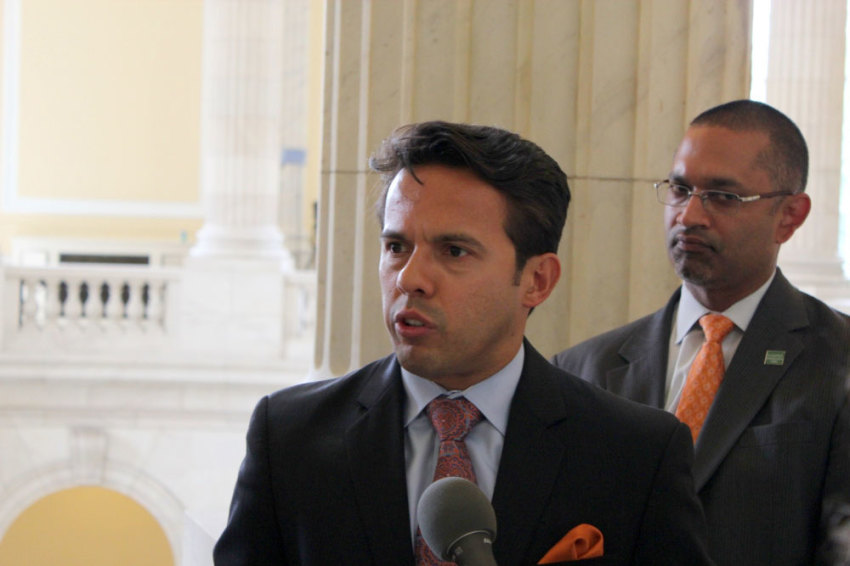Samuel Rodriguez Challenges Evangelicals to Reevalulate Death Penalty
In light of last month's botched execution in Oklahoma, the Rev. Samuel Rodriguez, president of the National Hispanic Leadership Conference, has called on Evangelicals to consider whether the death penalty fully recognizes the Imago Dei (Image of God) in the perpetrator.

Rodriguez, who authored a an op-ed this week in Time Magazine titled "Botched Oklahoma Execution Should Prompt Moral Outcry Among Evangelicals," told The Christian Post that as a "born-again, Bible believing, conservative Christian committed to biblical orthodoxy," he found himself "extremely bothered" by the execution that went awry.
"It is not justifying what this individual did whatsoever. Not at all," Rodriguez explained. "But the fact of the matter is that [with regards to the execution] there was a complete disregard for life and it's wrong. What he did as it goes to disregarding life was morally reprehensible. It was a violation of the pure essence of who we are as human beings and people created in the image of God and what they did to him at the end of his life was similarly wrong."
Rodriguez pointed out that the majority of those on death row "are impoverished individuals, not only spiritually but socioeconomically."
"They come from very difficult circumstances and again, we are privy to the act that historically as Americans, that there are individuals that have gone to death row where there has not been 100 percent certainty that these are the individuals that committed the crimes in the first place. So there is a shadow of a doubt, and because they couldn't afford proper representation, they went through a process, a hasty process, a expedited process, and they ended up on death row," said Rodriguez. "We need to be aware of that."
Rodriguez was not the only Evangelical to challenge Christians to rethink some of their thoughts on the death penalty. Going further than the Latino leader who claimed several times he was not interested in making his own convictions known at this time on the issue, author and blogger Jonathan Merritt asked in the Atlantic last week, "Would Jesus Support the Death Penalty?"
"Most Christian faithful assert as their central story that all humans were given the death penalty by God but then forgiven and saved from it by Christ, who took the penalty for them. Isn't it hypocritical to want the death penalty for others and not oneself?" wrote Merritt.
Merritt, who joined Christian social justice activist Shane Claiborne in visiting death-row inmates at Riverbend Maximum Security Institution last month, continued, "I spent more than an hour conversing with these men, four of whom have execution dates scheduled. I could feel the weight of desperate prayers and desperate pleas of desperate prisoners. While I sat talking with them, [Father John] Dear's words came to mind: "Killing people who kill people is not the way to show that killing people is wrong."
Not all have agreed with Merritt's argument. Although Dr. R. Albert Mohler Jr., president of The Southern Baptist Theological Seminary, acknowledged the system's flaws this week, including the "economic and racial injustice in how the death penalty is applied," and that while "the law itself is not prejudiced, the application of the death penalty often is," he nevertheless maintained that support for it was compatible with his Christian faith.
"I believe that Christians should hope, pray and strive for a society in which the death penalty, rightly and rarely applied, would make moral sense. This would be a society in which there is every protection for the rights of the accused, and every assurance that the social status of the murderer will not determine the sentence for the crime," wrote Mohler in an op-ed for CNN.
"Christians should work to ensure that there can be no reasonable doubt that the accused is indeed guilty of the crime. We must pray for a society in which the motive behind capital punishment is justice, and not merely revenge," he continued.
But Mohler explained, "God affirmed the death penalty for murder as he made his affirmation of human dignity clear to Noah. Our job is to make it clear to our neighbors."
Rodriguez said he hoped his column starts a dialogue among Evangelicals to reevalulate whether the death penalty truly honored the Imago Dei (Image of God) in everyone.
"As Christians sometimes we seem to suffer from myopia on certain subject matters. Because we suffer from myopia, we don't have a clear path to speak into issues that really require the Christian voice to arise," said Rodriguez. "And as an Evangelical, as a Christian committed to a conservative interpretation of Scripture, not only do we have a moral imperative, we have a responsibility to speak to anything that dilutes the image of God in any human being without exception and I found that to be one of those cases."



























